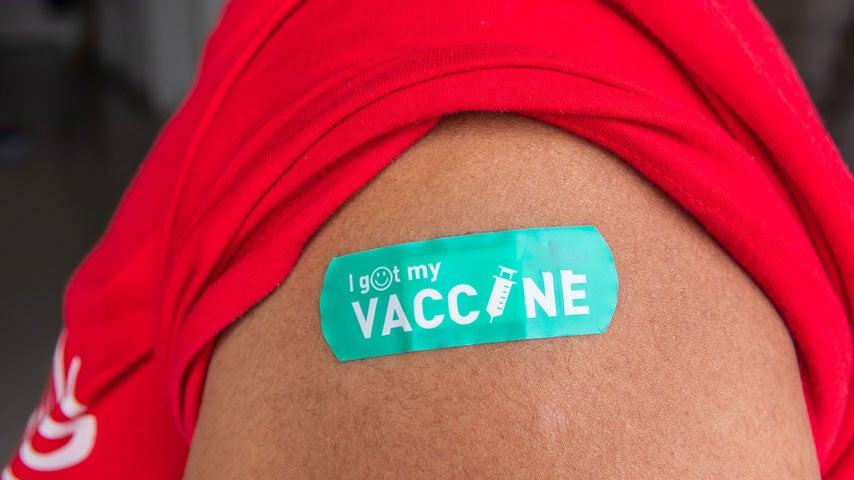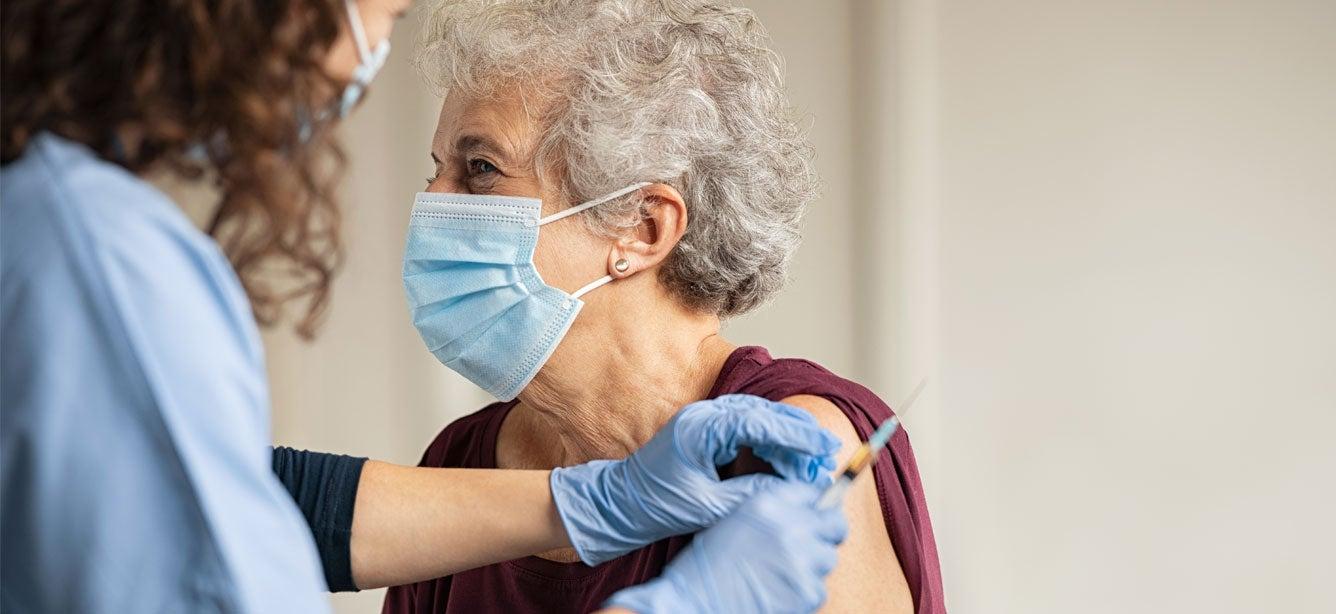
Related Topics
Positive lifestyle behaviors go a long way in helping us stay strong, active, and independent as we age. But even if we’re otherwise healthy, our immune systems naturally become less efficient at fighting off infection. That’s why older adults face a higher risk of severe illness from viruses like influenza and COVID.
mRNA vaccines offer a safe, highly effective way for older adults to protect themselves against disease. Understanding how these vaccines work, and their distinct advantages over conventional vaccines, can help you make informed decisions about your health.
What are mRNA vaccines?
Messenger RNA (mRNA) vaccines are a type of vaccine that instructs cells in the body to produce a harmless piece of a virus—like the spike protein found on the surface of the COVID-19 virus (SARS-CoV-2).This small piece of the virus triggers our immune system to recognize it and produce antibodies in response. If we’re later exposed to the actual virus while out shopping or at a social gathering, our immune system is already primed to fight it off and protect us from serious illness.
Unlike traditional vaccines, which typically use a weakened or inactive form of the virus, mRNA vaccines use a small piece of genetic code to achieve the same result. This technology allows for faster development and a more targeted immune response, making it especially valuable in preventing serious illness from viruses like COVID.
It's important to know that mRNA technology is not new; it has a long history behind it. According to the Centers for Disease Control and Prevention (CDC), scientists have been researching and working with mRNA vaccines for decades.
What are the advantages of mRNA-based vaccines?
Why are mRNA vaccines so important for older people? Common infectious diseases can lead to severe illness, hospitalization, or even death in this population. For example:
- Older adults continue to be at highest risk for getting very ill from COVID. Between July 2024 and June 2025, COVID deaths were highest among adults age 65 and older (4,009 deaths), with rates jumping significantly among those 75 and older (16,375 deaths).1 In addition, the risk of severe illness from COVID grows along with the number of chronic conditions a person has—such as obesity, diabetes, or sickle cell disease.2
- The seasonal flu, which typically causes mild illness in younger people, poses a real danger to older people. Adults age 65+ are at much greater risk for developing serious complications from the flu compared with their younger, healthier counterparts.3
Although mRNA and traditional vaccine can't prevent you from catching COVID, they do provide a powerful line of defense that can significantly reduce the risk of negative health outcomes.
Five key advantages of mRNA vaccine technology
- High efficacy in preventing severe illness. One of the most important benefits of mRNA vaccines is their high success rate in preventing serious illness, hospitalization, and death. Early clinical trials for the two COVID mRNA vaccines showed a minimum 94% efficacy in preventing infection and high efficacy in preventing severe disease, hospitalization, and death.4 For older Americans who already have an elevated risk, this level of protection can mean the difference between a mild infection and a life-threatening one.
- Rapid vaccine development. Why are mRNA vaccines faster to develop? Since they don’t require the growth of live virus cultures in a lab—a very time-consuming process—these vaccines can be developed with much greater speed than traditional vaccines. Once the mRNA is designed and synthesized, it can be quickly mass-produced. This was an important advantage at the peak of the COVID pandemic, as the swift development of mRNA vaccines enabled a faster and more efficient national and global vaccination effort. For older adults, this means quicker access to critical protection during viral outbreaks.
- Adaptability to different strains and pathogens. As viruses like COVID and the flu mutate, new variants can emerge that might make traditional vaccines less effective. One of the key advantages of mRNA vaccines is their adaptability. Because mRNA technology allows for faster vaccine development, scientists can quickly update the vaccine formula to target new variants. This is a valuable advantage for older adults, as it ensures they’re protected against the most current strains of the virus. The adaptability of mRNA vaccines also means they can potentially be used to target entirely different pathogens—even in one vaccine.
- Positive safety profile. The FDA granted Emergency Use Authorization (EUA) for the two available COVID mRNA vaccines at the height of the pandemic to allow them to be deployed quickly. In 2021, Pfizer-BioNTech’s COMIRNATY® was granted full FDA approval, followed by Moderna’s Spikevax® in 2022. These vaccines were thoroughly tested for safety through multiple phases of clinical trials before being approved for public use. The trials included tens of thousands of volunteers of all ages—including older adults and those with underlying health conditions—to ensure the vaccine is both safe and effective in all types of people.Since then, both COVID mRNA vaccines have been updated yearly to protect against current and emerging variants circulating in communities. They continue to be monitored for any rare side effects through ongoing safety surveillance systems. When it comes to mRNA vaccine safety, it's important to know the facts. Unlike some conventional vaccines, mRNA vaccines do not contain any live virus. The vaccines do not alter our DNA or even enter our cells at all (that's where our DNA is found). Additionally, mRNA vaccines do not linger in our bodies, causing harmful health effects over time. In reality, once the mRNA delivers instructions to our cells, it's quickly broken down and flushed out of the body.
- Fewer side effects for people who are immunocompromised. Older adults can be more sensitive to the side effects of traditional vaccines. mRNA vaccines have been found to have a favorable safety profile, with most side effects being mild and short-lived, such as soreness at the injection site, mild fatigue, fever, chills, and body aches.
Note: There have been rare reports of myocarditis (inflammation of the heart muscle) and pericarditis (inflammation of the pericardium, the sac-like tissue surrounding the heart) after receiving mRNA vaccines. Males between the ages of 12 and 24 are most impacted by these conditions (roughly 27 cases per million), and most of the affected patients had completed a two-dose primary series of an mRNA COVID vaccine before their diagnosis. Studies are currently underway to determine if there are long-term heart effects in people who have had myocarditis following an mRNA COVID vaccine.
In general, serious side effects related to mRNA vaccines are rare, and the protective benefits far outweigh the risks—especially for older people and those with underlying health conditions.
Get your updated vaccines today
The Centers for Disease Control and Prevention (CDC) Advisory Committee on Immunization Practices (ACIP) voted on Sept. 19, 2025, to update the COVID vaccine schedule. Now, vaccination for everyone age 6 months and older is based on personal decision-making done in partnership with a health care provider. The vaccine will continue to be fully covered by Medicare and Medicaid with no out-of-pocket costs to beneficiaries.
Getting an updated COVID vaccine lowers your risk of severe illness, hospitalization, and death, helping you maintain your health, independence, and quality of life.
It’s especially important if you:
- Are age 65 or older
- Have health conditions that raise your risk (e.g., cancer or diabetes)
- Live in a long-term care facility
“NCOA continues to stand behind vaccines as a safe and effective way for older adults to protect both themselves and others,” says Dorothea Vafiadis, Senior Director of NCOA’s Center for Healthy Aging. “We encourage you to talk to your doctor about your personal risk factors and to stay up to date by getting the updated 2025-2026 COVID vaccine. It’s still the best way to avoid severe outcomes and protect health, independence, and quality of life.”
CDC also advises that everyone age six months and older get an updated flu vaccine. These vaccines have been reformulated for the 2025-2026 season.
You can be an inspiration and a role model by rolling up your sleeve to get your shots this fall. Encourage people you know to do the same. Sharing the facts about vaccines can help save lives—and we all have a part to play.
Great news: The COVID vaccine as well as all vaccines recommended by ACIP for older adults are fully covered by Medicare and Medicaid.
Need help getting a flu or COVID vaccine?
Find COVID and flu vaccination sites near you by contacting your health care provider or local pharmacy.
You can also:
- Dial 211 or reach out to your state health department.
- Reach out to organizations that support older adults and people with disabilities:
- The Aging Network: 1-800-677-1116
- Eldercare Locator: Search by ZIP code at eldercare.acl.gov
- Disability Information and Access Line (DIAL): 1-888-677-1199 or email DIAL@n4a.org
- Medicare hotline: 1-800-633-4227 (TTY 1-877-486-2048)
Sources
1. CDC National Center for Immunization and Respiratory Diseases. Current Epidemiology of COVID-19. June 25, 2025.
2. Centers for Disease Control and Prevention (CDC). People with Certain Medical Conditions and COVID-19 Risk Factors. Found on the internet at https://www.cdc.gov/covid/risk-factors/index.html
3. Centers for Disease Control and Prevention (CDC). Flu and People 65 Years and Older. Found on the internet at https://www.cdc.gov/flu/highrisk/65over.htm
4. Yahya F. Jamous, et. al. The Safety and Effectiveness of mRNA Vaccines Against SARS-CoV-2. Cureus. September 15, 2023. Found on the internet at https://www.ncbi.nlm.nih.gov/pmc/articles/PMC10588549/#REF12



